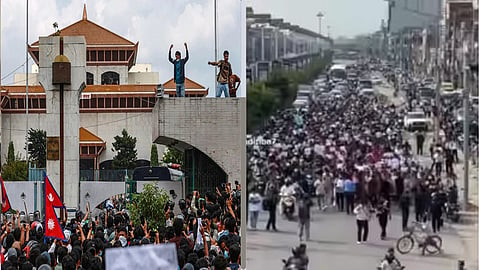

Kathmandu | The Nepal Army on Wednesday imposed nationwide restrictive orders followed by a curfew to quell possible violence under the guise of protests, a day after Prime Minister K P Sharma Oli resigned in the face of massive anti-government demonstrations.
The army, which took control of nationwide security operations from Tuesday night after incidents of arson and vandalism across the country, said the restrictive orders will remain in force until 5:00 pm Wednesday, and then a curfew will be in place until 6 am Thursday.
The Nepalese capital wore a deserted look as soldiers guarded the streets and ordered people to stay at home, a day after protesters set fire to the Parliament, the President's Office, the PM's residence, government buildings, Supreme Court, political parties' offices and homes of senior leaders.
In a statement, the army said the measures were necessitated to curb possible incidents of looting, arson, and other destructive activities "under the guise of agitation".
The army warned that any form of demonstrations, vandalism, arson, or attacks on individuals and property during the restrictive period would be treated as criminal acts and dealt with accordingly.
"There are also possible threats of rape and violent attacks against individuals," the statement said. "Keeping in view the security situation of the country, restrictive orders and a curfew have been enforced." The statement clarified that vehicles and personnel engaged in essential services, including ambulances, fire engines, health workers, and security forces, would be permitted to operate during the restrictive orders and curfew.
In a separate statement, the army expressed concern over the actions of certain groups, which are "taking undue advantage of the difficult situation" and causing “severe damage to ordinary citizens and public property.” "We have deployed our troops to prevent any untoward incidents, including looting and vandalism,” said an officer from the Nepal Army headquarters.
The army has requested that foreign nationals stranded due to the current situation contact the nearest security post or personnel for rescue or any other assistance. It also requested hotels, tourism entrepreneurs and related agencies to provide necessary help to needy foreign nationals.
The authorities have also issued orders for residents to remain indoors unless "absolutely necessary", in a bid to prevent further unrest, he said.
Since early morning, the normally bustling streets of Kathmandu wore a deserted look. Only a few residents ventured out, primarily to stock up on daily essentials.
Roads were heavily patrolled by security personnel, and fire trucks were deployed to douse blazes in government and private buildings torched by agitators on Tuesday.
The army also urged people to return guns, weapons and bullets looted or found during the student-led agitation to the nearest police post or security personnel.
"As there are chances of such weapons being misused, please inform the authorities and return them to the security agencies at the earliest,” the military said in another statement.
It warned that legal action would be taken against anyone found possessing such arms or ammunition without returning them.
The army also appealed to citizens "not to wear army uniforms in this sensitive period, as it is illegal to do so".
Kathmandu's Tribhuvan International Airport (TIA) was closed on Wednesday and will remain closed until further notice. The flight services at the airport were partially suspended in view of the protests on Tuesday.
In a public notice, the airport officials said the closure is due to the ongoing critical situation and urged passengers and stakeholders to await further updates.
Earlier, the TIA had announced a temporary closure until 6 pm Wednesday, but operations have now been halted without a reopening timeline, news portal Khabarhub said.
The shutdown has affected both domestic and international flights, leaving hundreds of passengers stranded. Airlines have advised travellers to stay in contact with their respective carriers for updates.
Meanwhile, security personnel arrested 27 people involved in looting, arson and vandalism from different parts of Kathmandu, officials said.
During the operations, Rs 3.37 lakh in cash, along with 31 weapons, magazines and bullets, were recovered from individuals in Chabahil, Bauddha and Gaushala areas of Kathmandu.
The army appealed to the public to cooperate with security agencies in restoring peace and maintaining law and order.
United Nations Secretary-General António Guterres has expressed grave concern over the developments in Nepal and said he was "closely following the situation" and was "deeply saddened by the loss of life." He called for a thorough and independent investigation into the fatalities, urging authorities to comply with human rights law, exercise restraint, and prioritise dialogue.
Prime Minister Oli quit on Tuesday shortly after hundreds of agitators entered his office demanding his resignation for the death of at least 19 people in police action during Monday's protests over corruption and a social media ban. However, his resignation had little effect on the protesters, who continued their demonstrations. The ban on social media was lifted Monday night.
